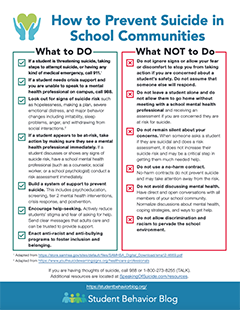|
SRI Education Update May 2023 |
|
|
|
|
|
|
 At SRI Education, we recognize the vital role that mental health plays in academic success and social-emotional development of students and well-being of educators. Further, trauma-informed programs provide evidence-based strategies to help students and educators manage the impact of traumatic experiences on students’ academic and social-emotional development and teacher well-being. This newsletter describes some of our resources, research, and training that support mental-health awareness and trauma-informed practices in schools and communities. |
|
|
5 Things that Everyone in Schools Should Know about Suicide PreventionAs we navigate the aftermath of the pandemic and address the alarming rise in youth suicide rates, it’s critical for all individuals who interact with schools—including parents—to understand the best practices for suicide prevention. Knowing what to do (and what not to do) is essential. Our blog post, “5 Things that Everyone in Schools Should Know about Suicide Prevention,” is available in English and Spanish and includes a downloadable and printable flyer on “How to Prevent Suicide in School Communities.” If you are having thoughts of suicide, call 988 or 1-800-273-8255 (TALK). Additional resources are located at SpeakingOfSuicide.com/resources. |
 |
|
|
|
Local Trauma-informed Care Resources Empower CommunitiesSRI Education Researcher, Dr. Michelle Woodbridge (who has been studying prevention and intervention programs related to school-based mental health for more than 25 years) discusses the benefits of collecting and sharing information about local community resources with participants in research studies. Check out this quick video: Local trauma-informed care resources empower communities (produced by the 3C Institute.) |
 |
|
|
|
Supporting Educators’ Mental HealthTo learn about and find resources for helping with secondary traumatic stress (STS)—the compassion fatigue many practitioners and professionals experience when they work with individuals who have suffered from trauma, explore the following resources: |
 |
|
|
|
|
 |
|
Scaling up Pyramid Model Implementation in Preschool and Kindergarten ClassroomsSRI Education researchers have evaluated the Pyramid Model, a three-tiered framework that helps early childhood teachers in preschool classrooms promote social-emotional skills and competence of children with and without disabilities so that all children can learn, develop, and grow in a positive and safe environment. Funded by a federal Department of Education Innovation and Research (EIR) mid-phase grant, the evaluation found that district-hired coaches increased teachers’ use of positive, responsive strategies that support students’ social-emotional well-being and decreased teachers’ use of negative “red-flag” responses (“no,” “stop,” and/or “don’t”). Our findings also showed that when implemented with fidelity, the Pyramid Model improved preschool students’ early math skills and kindergarten students’ social problem-solving skills. This is one of the few early childhood social-emotional learning (SEL) intervention studies to show positive effects on early academic skills. Learn more about Practice-Based Coaching on the Pyramid Model in this blog post: “It builds you up and finds your strengths.” SRI Education principal researcher, Erika Gaylor, will continue her Pyramid Model evaluation work in partnership with Vanderbilt University developers and researchers on the U.S. Department of Education’s Office of Elementary and Secondary Education study, “Expanding and Scaling the Pyramid Model in Pre-Kindergarten and Kindergarten Classrooms to Districts Across the U.S.” This study will include participating teachers serving 5,000 children in four states, including children with disabilities, children living in poverty, children at risk for delays or disabilities, and children at risk for being suspended or expelled from school. Project SECURE: Keeping Kids Safe within a Trauma-Informed Multi-Tiered System of SupportFunded by the U.S. Department of Justice/National Institute of Justice, SRI Education conducted a randomized controlled trial of Project SECURE in partnership with a local school district in Northern California. The objective was to evaluate the efficacy of Second Step, a schoolwide (Tier 1) social-emotional learning program, and Bounce Back, a Tier 2 intervention for children exposed to trauma, in 36 elementary schools in the district. Findings indicated that students who received the Bounce Back intervention reported significantly reduced symptoms of anxiety than students in the comparison group. Interestingly, the results were not differentiated by the delivery of Second Step; in other words, there was no added effect for students in schools implementing Second Step in addition to Bounce Back. Learn more about Bounce Back and Project SECURE. |
|
|
|
 |
|
Handle With Care (HWC) Virtual Learning AcademySRI Education staff worked with HWC West Virginia to launch a Virtual Learning Academy that provides valuable information for educators on the HWC program and on implementing trauma-sensitive strategies in school. Interested individuals can take the free, online courses at their leisure and/or register and work through the classes and obtain a certificate of attendance. One of the courses, Handle With Care Trauma Training to Support Students Experiencing Trauma, is a 13-part series (each video is about 15 minutes) that focuses on topics such as understanding trauma, creating a trauma-informed school environment, identifying trauma-sensitive interventions for students, and educator self-care strategies. Access the Handle With Care Virtual Learning Academy. | |
|
|
|
Trauma Support for SchoolsThe Regional Educational Laboratory Appalachia (REL AP) at SRI Education and the Cross-State Collaborative to Support Schools in the Opioid Crisis hosted a 2-day virtual summit: “How to Support Students and Educators Dealing with Trauma in 2021.” This summit was for researchers, practitioners, and policymakers who support preK-12 educators and students experiencing trauma. Resources compiled for the summit are available online at Trauma Support for Schools.
Watch the webinars now: Addressing Trauma in Educational Settings. |
|
|
|
Here are some quick links to additional resources developed by SRI Education researchers.
For more resources, go to StudentBehaviorBlog.org. |
|
||
 |
 |
 |
|
|
|
|
|
|
|
|
|
SRI Education, a division of SRI International, is helping federal and state agencies, school districts, major foundations, nonprofit organizations, and international and commercial clients tackle some of the most complex issues in education to help students succeed. Our mission is to reduce barriers, optimize outcomes, and ensure educational equity for all children, youth, and families. We do this by conducting high-quality research, supporting use of data and evidence, helping to strengthen state and local systems, and developing tools that improve teaching and accelerate and deepen learning. Our work covers a range of topics: early learning and development, disability and inclusion, supporting multilingual learners, student behavior and well-being, teaching quality, digital learning, STEM and computer science, and literacy and language arts, and college and career pathways. We believe diversity in our organization and project teams leads to better and more equitable research and technical assistance, resulting in improved outcomes for all. SRI International is a nonprofit research institute whose innovations have created new industries, extraordinary marketplace value, and lasting benefits to society. |
|
|
|
|
|
© 2023 SRI International. |



